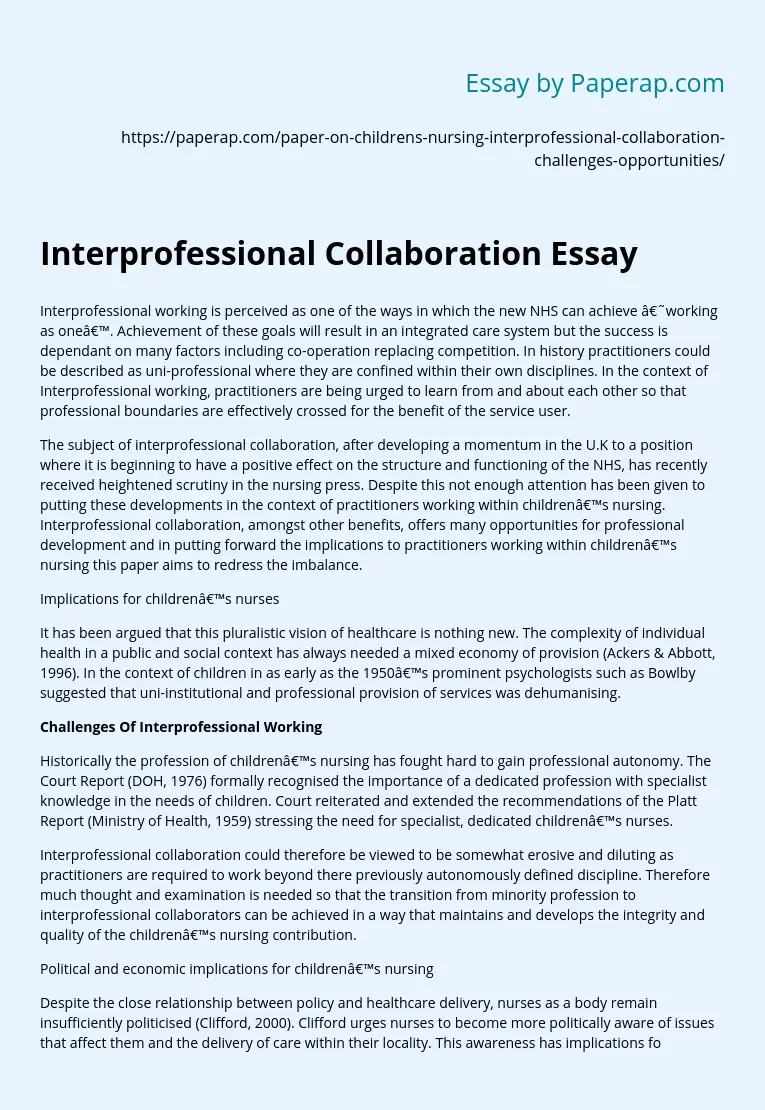Interprofessional Collaboration Essay
Interprofessional working is perceived as one of the ways in which the new NHS can achieve ‘working as one’. Achievement of these goals will result in an integrated care system but the success is dependant on many factors including co-operation replacing competition. In history practitioners could be described as uni-professional where they are confined within their own disciplines. In the context of Interprofessional working, practitioners are being urged to learn from and about each other so that professional boundaries are effectively crossed for the benefit of the service user.
The subject of interprofessional collaboration, after developing a momentum in the U.K to a position where it is beginning to have a positive effect on the structure and functioning of the NHS, has recently received heightened scrutiny in the nursing press. Despite this not enough attention has been given to putting these developments in the context of practitioners working within children’s nursing. Interprofessional collaboration, amongst other benefits, offers many opportunities for professional development and in putting forward the implications to practitioners working within children’s nursing this paper aims to redress the imbalance.
Implications for children’s nurses
It has been argued that this pluralistic vision of healthcare is nothing new. The complexity of individual health in a public and social context has always needed a mixed economy of provision (Ackers & Abbott, 1996). In the context of children in as early as the 1950’s prominent psychologists such as Bowlby suggested that uni-institutional and professional provision of services was dehumanising.
Challenges Of Interprofessional Working
Historically the profession of children’s nursing has fought hard to gain professional autonomy.
The Court Report (DOH, 1976) formally recognised the importance of a dedicated profession with specialist knowledge in the needs of children. Court reiterated and extended the recommendations of the Platt Report (Ministry of Health, 1959) stressing the need for specialist, dedicated children’s nurses.
Interprofessional collaboration could therefore be viewed to be somewhat erosive and diluting as practitioners are required to work beyond there previously autonomously defined discipline. Therefore much thought and examination is needed so that the transition from minority profession to interprofessional collaborators can be achieved in a way that maintains and develops the integrity and quality of the children’s nursing contribution.
Political and economic implications for children’s nursing
Despite the close relationship between policy and healthcare delivery, nurses as a body remain insufficiently politicised (Clifford, 2000). Clifford urges nurses to become more politically aware of issues that affect them and the delivery of care within their locality. This awareness has implications for children’s nurses if they are to overcome the potential hazards of being a minority profession and to avoid being sidelined within an adult biased healthcare structure.
In recent decades there has been a growth in training and development of specialist skills in children’s nursing an example of which can be seen in paediatric intensive care. In 1993 the British Paediatric Association stressed the importance of suitably qualified nurses to care for critically ill children. However this is not to suggest that being a children’s nurse is just about the acquisition of specific knowledge and skills. Such a perception would reduce the profession to the status of technicians. Overlooking the wider awareness, understanding and knowledge that are crucial to meet the complexity within child and family care.
As mentioned earlier one of the ways in which traditional barriers can be overcome is to create a process where practitioners can learn from and about each other. This encourages practitioners to work across traditional boundaries and therefore this learning is considered to be a crucial component of interprofessional working. On an interpersonal level collaboration is a process that occurs between individuals. And whilst organisations may urge and advocate ways of working they cannot ensure their success (Lupton & Khan, 1998). Only the individuals involved can determine whether or not collaboration occurs. In order to achieve successful collaboration communication is needed so that an environment of trust can be achieved. The skills that have been identified in creating these environments of trust and respect are listening skills, ability to articulate individual and professional contributions, and negotiation skills. Without this level of communication interprofessional working is likely to continue to be affected at an interpersonal level by issues of status, class and gender.
An example of how interpersonal stereotypes can have a detrimental impact on collaboration at an interpersonal level can be seen in the Jasmine Beckford child abuse inquiry (Blyth & Milner, 1990). The inquiry highlighted that a female health visitor had voiced legitimate concerns yet they were ignored in favour of those of a male doctor. Subsequent work in this area of nurse-doctor relationships (Mackay, 1995: Kendrick, 1995) has identified role-socialization as playing an important part in perpetuating stereotypes. In contrast Carpenter (1995) highlights that nurses also have stereotypes of doctors that also have a negative impact on collaboration.
In conclusion this article has sought to illustrate the complexities, at every level, of interprofessional working. It highlights the common belief that the key to successful collaboration is professional self-confidence, which evolves from the development of the core skills and knowledge discussed previously.
Interprofessional Collaboration Essay. (2019, Dec 05). Retrieved from https://paperap.com/paper-on-childrens-nursing-interprofessional-collaboration-challenges-opportunities/

